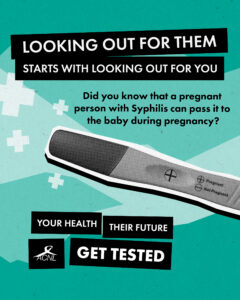Links
Syphilis in Pregnancy and Infants (Congenital Syphilis)
Congenital Syphilis is an infection passed from a pregnant person to a baby during pregnancy or childbirth.
Protect yourself and your baby
- Syphilis during pregnancy can result in miscarriage, preterm birth, and stillbirth.
- Babies born with syphilis can have significant birth defects and growth and developmental delays.
- Syphilis transmission occurs through unprotected vaginal, anal, and/or oral sex and sharing of equipment for drug use and/or sex toys.
- The best way to prevent syphilis and congenital syphilis is to practice safer sex.
How do I know if I have syphilis?
- You can have syphilis and not show any symptoms at all.
- Symptoms can include sores in the mouth, anal and genital area, a rash, fatigue, fever and swollen glands.
The only way to know if you have syphilis is to get tested.
Make syphilis testing a part of your regular prenatal care! Contact your health-care provider.
Testing and treatment
-

“Know More, Test More” Syphilis Campaign (Aids Committee of NL) Getting tested and treated for syphilis is important for your health. It can prevent you from passing the infection to others, including your baby.
- Ask your health-care provider about testing for syphilis.
- Getting testing for syphilis requires a blood test.
- More information on getting tested is available on the Get Tested, STBBIs page.
- To detect and treat syphilis as early as possible, it is recommended that all pregnant people receive testing:
- in their first trimester or at their first prenatal visit AND
- At 28-32 weeks’ gestation (or as close to that time as possible)
- If you are pregnant and live in an area where there is a syphilis outbreak or a high risk of syphilis infection, added testing at the time of delivery is recommended.
If detected early, syphilis can be safely treated and cured with an antibiotic during pregnancy.
- The risk of syphilis to a baby is higher if treatment is received later in pregnancy or if not treated at all.
Contact your local health-care provider to discuss prevention, testing and treatment!
Testing available through NL Health Services:
- Eastern-Urban:
- Contact the Sexual Health Clinic at sexualhealthclinic@easternhealth.ca (NLHS Eastern-Urban Zone)
- Contact the community walk-in clinic at 709-777-1706
- Labrador-Grenfell Zone:
- Point of Care Testing for Syphilis and HIV are available in the following locations:
- Nain Community Clinic, 28 Ikajuktauvik St. – (709) 922-2912
- Natuashish Community Clinic, 82 Katshinak St. – (709) 478-8842
- Hopedale Community Clinic, 16 Centre St – (709) 933-3857
- Makkovik Community Clinic, 42-50 Moravian St. – (709) 923-2229
- Postville Community Clinic, 3 Park Dr. – (709) 479-9851
- Rigolet Community Clinic, 7 Riche’s Seashore Dr. – (709) 947-3386
- Mani Ashini Community Clinic, North West River/Sheshatshiu, 193 Shimun St. – (709) 497-8351
- For all other locations, please contact your local community clinic or health centre.
- Find your nearest testing site: Know More, Test More, Aids Committee of NL
Other testing options:
- Make an appointment with your health-care provider.
- Contact Planned Parenthood — NL Sexual Health Centre at 1-877 NO MYTHS (666-9847) or 709-579-1009
- Medicuro Virtual Health Clinic
- Virtual health care offered by health-care providers in Newfoundland & Labrador.
Other services related to this information:
- Contact your Public Health Nurse.
- 811 HealthLine (Newfoundland & Labrador) – Call 811 or 1-888-709-2929 / TTY 1-888-709-3555
- Safe Works Access Program (SWAP), AIDS Committee of Newfoundland and Labrador (ACNL)

